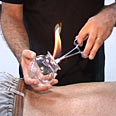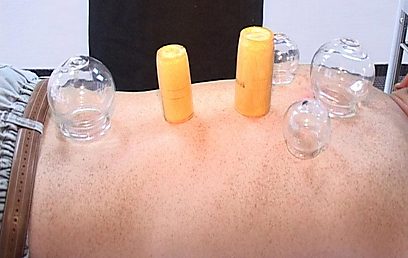
In a Gaza shop, a group of men sit with glass jars attached to their legs, their backs, their faces, sucking at the skin as blood slowly seeps out. It is the latest craze in the isolated coastal strip - cupping therapy.
Cupping is an ancient form of alternative medicine whose advocates believe it improves blood flow and helps relieve a range of ailments from headaches to arthritis. It is perhaps best known in the West as part of traditional Chinese medicine.
Related stories:
- Rabbis: Alternative medicine based on idolatry
- Half of Israelis use alternative medicine
- Op-ed: Don't be confused by Nobel
But Gazans are not just lining up for it for its therapeutic purposes. To them, it is a way of being devout Muslims.
Hijama - as the Islamic version of the practice is called - is specifically mentioned and encouraged by the Prophet Muhammad, who according to tradition said, "Hijama is the best of your remedies."

Tradition is alive and well in Gaza (Photo: Dalit Shaham)
There are several forms of cupping therapy. In the Gaza variety, small light scratches are made on the skin and then blood is drawn by a vacuum created by a fire lit inside a glass jar.
Anwar Sheikh-Eid, a 42-year-old Baghdad University-trained veterinarian, has been performing cupping for 15 years.
"According to books, it is reported that the Prophet recommended doing hijama on the two veins at the side of the neck and the base of the neck," he said, from his humble shop in the southern Gaza Strip city of Rafah. "But he also used hijama on the top of the head, on his hip for a pain in that area, as well on the top of his foot."
The mainstream medical community has mixed feelings about cupping. While the bloody practice may not be easy on the eye, proponents hail its healing capabilities. Muslim tradition recommends it three times a month.
"It helps me relax. I sleep more, get more energy and I recommend it to many friends," said Jamil al-Dayya, a 60-year-old Gaza dentist. "But you need to find a well-trained therapist who knows what he is doing and to make sure that the tools are clean."
For that he turns to Sheikh-Eid, whose desk is filled with glass jars containing herbs and where a strong smell of homemade apple vinegar permeates. Vinegar is a popular alternative remedy for removing toxins from the body.
He said customers run the gamut of ages, backgrounds and motives. Some arrive for relief from illness or stress while others seek to feel closer to their prophet. Men seated in his shop had the cups - with burning pieces of paper inside them - attached to various places of their bodies. Their skin bulged out as their blood dripped into the jars.
But Sheikh-Eid insists it is not painful.
"It's probably similar to having a blood test," he said. "Hijama is not as intrusive as a blood test, though, since it does not penetrate the veins."
There are dozens of practitioners across the Gaza Strip.
Shaaban Assad, the former manager of the Gaza Health Ministry, said the remedy is recognized by the World Health Organization and has proven to help cure many diseases, strengthen the immune system and reduce blood pressure.
"We need to make sure of the sterilization of the tools," he said. "Lack of experience by some people who claim that they can do it causes health problems."
The World Health Organization's expert on traditional medicine, Dr. Zhang Qi, says the organization has not yet conducted research or adopted an official position on cupping. He said the technique has long been used by traditional medicine practitioners in China - though traditional Chinese cupping rarely draws blood.
The practice is also widespread in Gulf countries, Zhang said.
The World Health Organization adopted a resolution in 2009 calling on countries to integrate traditional medicine into national health systems, as well as encouraging collaborations between conventional and traditional medicine practitioners.















